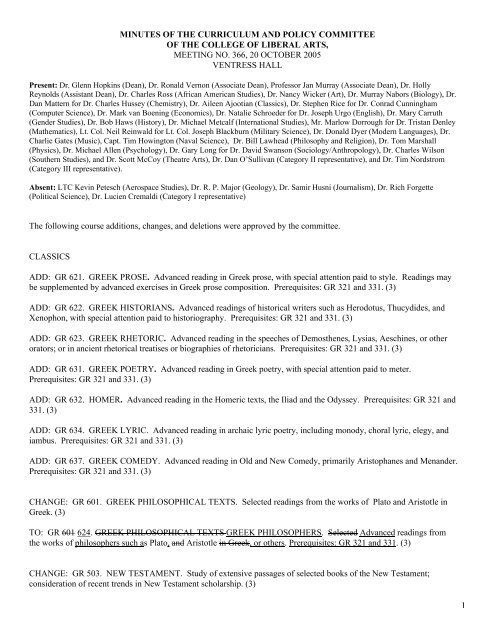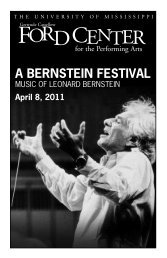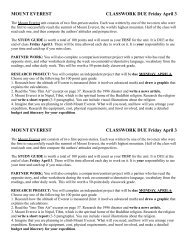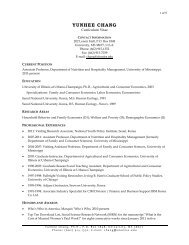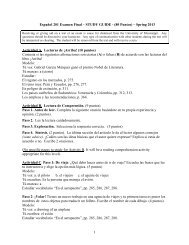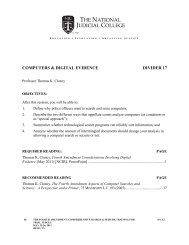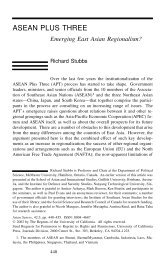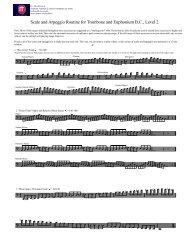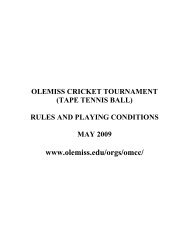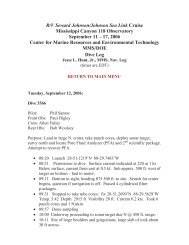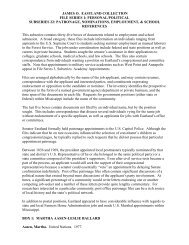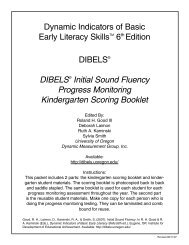October 2005
October 2005
October 2005
Create successful ePaper yourself
Turn your PDF publications into a flip-book with our unique Google optimized e-Paper software.
MINUTES OF THE CURRICULUM AND POLICY COMMITTEE<br />
OF THE COLLEGE OF LIBERAL ARTS,<br />
MEETING NO. 366, 20 OCTOBER <strong>2005</strong><br />
VENTRESS HALL<br />
Present: Dr. Glenn Hopkins (Dean), Dr. Ronald Vernon (Associate Dean), Professor Jan Murray (Associate Dean), Dr. Holly<br />
Reynolds (Assistant Dean), Dr. Charles Ross (African American Studies), Dr. Nancy Wicker (Art), Dr. Murray Nabors (Biology), Dr.<br />
Dan Mattern for Dr. Charles Hussey (Chemistry), Dr. Aileen Ajootian (Classics), Dr. Stephen Rice for Dr. Conrad Cunningham<br />
(Computer Science), Dr. Mark van Boening (Economics), Dr. Natalie Schroeder for Dr. Joseph Urgo (English), Dr. Mary Carruth<br />
(Gender Studies), Dr. Bob Haws (History), Dr. Michael Metcalf (International Studies), Mr. Marlow Dorrough for Dr. Tristan Denley<br />
(Mathematics), Lt. Col. Neil Reinwald for Lt. Col. Joseph Blackburn (Military Science), Dr. Donald Dyer (Modern Languages), Dr.<br />
Charlie Gates (Music), Capt. Tim Howington (Naval Science), Dr. Bill Lawhead (Philosophy and Religion), Dr. Tom Marshall<br />
(Physics), Dr. Michael Allen (Psychology), Dr. Gary Long for Dr. David Swanson (Sociology/Anthropology), Dr. Charles Wilson<br />
(Southern Studies), and Dr. Scott McCoy (Theatre Arts), Dr. Dan O’Sullivan (Category II representative), and Dr. Tim Nordstrom<br />
(Category III representative).<br />
Absent: LTC Kevin Petesch (Aerospace Studies), Dr. R. P. Major (Geology), Dr. Samir Husni (Journalism), Dr. Rich Forgette<br />
(Political Science), Dr. Lucien Cremaldi (Category I representative)<br />
The following course additions, changes, and deletions were approved by the committee.<br />
CLASSICS<br />
ADD: GR 621. GREEK PROSE. Advanced reading in Greek prose, with special attention paid to style. Readings may<br />
be supplemented by advanced exercises in Greek prose composition. Prerequisites: GR 321 and 331. (3)<br />
ADD: GR 622. GREEK HISTORIANS. Advanced readings of historical writers such as Herodotus, Thucydides, and<br />
Xenophon, with special attention paid to historiography. Prerequisites: GR 321 and 331. (3)<br />
ADD: GR 623. GREEK RHETORIC. Advanced reading in the speeches of Demosthenes, Lysias, Aeschines, or other<br />
orators; or in ancient rhetorical treatises or biographies of rhetoricians. Prerequisites: GR 321 and 331. (3)<br />
ADD: GR 631. GREEK POETRY. Advanced reading in Greek poetry, with special attention paid to meter.<br />
Prerequisites: GR 321 and 331. (3)<br />
ADD: GR 632. HOMER. Advanced reading in the Homeric texts, the Iliad and the Odyssey. Prerequisites: GR 321 and<br />
331. (3)<br />
ADD: GR 634. GREEK LYRIC. Advanced reading in archaic lyric poetry, including monody, choral lyric, elegy, and<br />
iambus. Prerequisites: GR 321 and 331. (3)<br />
ADD: GR 637. GREEK COMEDY. Advanced reading in Old and New Comedy, primarily Aristophanes and Menander.<br />
Prerequisites: GR 321 and 331. (3)<br />
CHANGE: GR 601. GREEK PHILOSOPHICAL TEXTS. Selected readings from the works of Plato and Aristotle in<br />
Greek. (3)<br />
TO: GR 601 624. GREEK PHILOSOPHICAL TEXTS GREEK PHILOSOPHERS. Selected Advanced readings from<br />
the works of philosophers such as Plato, and Aristotle in Greek, or others. Prerequisites: GR 321 and 331. (3)<br />
CHANGE: GR 503. NEW TESTAMENT. Study of extensive passages of selected books of the New Testament;<br />
consideration of recent trends in New Testament scholarship. (3)<br />
1
TO: GR 503 629. NEW TESTAMENT KOINE GREEK. Study of extensive passages of selected books of the New<br />
Testament; consideration of recent trends in New Testament scholarship. Advanced readings in the koinê or commonly<br />
used Greek of the Hellenistic period, such as the Christian New Testament and the Septuagint version of the Hebrew<br />
Bible. Prerequisites: GR 321 and 331. (3)<br />
CHANGE: GR 603. GREEK TRAGEDY. Selected readings from the works of Aeschylus, Sophocles, and Euripides in<br />
Greek. (3)<br />
TO: GR 603 636. GREEK TRAGEDY. Selected Advanced readings from the works of Aeschylus, Sophocles, and<br />
Euripides in Greek. Prerequisites: GR 321 and 331. (3)<br />
CHANGE: GR 691. DIRECTED READING IN GREEK LITERATURE. Reading and study, arranged according to<br />
needs of individual students. (May be repeated for additional reading and credit.) (1-3).<br />
TO: GR 691. DIRECTED READING IN GREEK LITERATURE. Reading and study, arranged according to needs of<br />
individual students. (May be repeated for additional reading and credit.) once for a maximum of 6 hours. Prerequisites:<br />
GR 321 and 331. (1-3).<br />
ADD: LAT 621. LATIN PROSE. Advanced reading in Latin prose, with special attention paid to style. Readings may<br />
be supplemented by advanced exercises in Latin prose composition. Prerequisites: LAT 321 AND 331. (3)<br />
ADD: LAT 622. ROMAN HISTORIANS. Advanced readings of historical writers such as Livy, Sallust, and Tacitus,<br />
with special attention paid to historiography. Prerequisites: LAT 321 and 331. (3)<br />
ADD: LAT 623. ROMAN ORATORY. Advanced reading from the speeches or rhetorical treatises of Cicero or others.<br />
Prerequisites: LAT 321 and 331. (3)<br />
ADD: LAT 631. LATIN POETRY. Advanced reading in Latin poetry, with special attention paid to meter.<br />
Prerequisites: LAT 321 and 331. (3)<br />
ADD: LAT 632. VERGIL. Advanced readings from the Aeneid, Bucolics, or Georgics of Vergil. Prerequisites: LAT<br />
321 and 331.(3)<br />
ADD: LAT 633. OVID. Advanced readings in the works of Ovid, such as the Metamorphoses, Fasti, Tristia, and<br />
Epistulae ex Ponto. Prerequisites: LAT 321 and 331. (3)<br />
ADD: LAT 634. ROMAN LYRIC. Advanced readings in the Lyric poets, such as Catullus and Horace. Prerequisites:<br />
LAT 321 and 331. (3)<br />
ADD: LAT 635. ROMAN ELEGY. Advanced readings from the elegiac poets, such as Tibullus, Propertius, Ovid, and<br />
Sulpicia. Prerequisites: LAT 321 and 331 (3)<br />
ADD: LAT 637. ROMAN COMEDY. Advanced readings from the plays of Plautus and Terence. Prerequisites: LAT<br />
321 and 331. (3)<br />
ADD: LAT 638. ROMAN SATIRE. Advanced readings from the satires of Horace, Juvenal, Persius, or Martial.<br />
Prerequisites: LAT 321 and 331. (3)<br />
ADD: LAT 691. DIRECTED READING IN LATIN LITERATURE. Reading and study, arranged according to the<br />
needs of individual students. May be repeated once for a maximum of 6 hours. Prerequisites: LAT 321 and 331. (1-3)<br />
2
DELETE: LAT 604. SILVER LATIN LITERATURE. Translation and analysis of the works of major authors of the<br />
post-Augustan period such as Petronius, Juvenal, Tacitus, Suetonius, and Pliny. (3)<br />
DELETE: LAT 603. LATIN LITERATURE OF THE REPUBLIC. Translation and analysis of the works of major<br />
authors of the Republican period such as Plautus, Terence, Caesar, Cicero, Lucretius, and Sallust. (3)<br />
DELETE: LAT 602. WRITERS OF THE AUGUSTAN AGE. The chief authors of the period and the political and<br />
literary background which influenced them. (3)<br />
DELETE: LAT 601. WRITERS OF THE AUGUSTAN AGE. The chief authors of the period and the political and<br />
literary background which influenced them. (3)<br />
CHANGE: LAT 608. MEDIEVAL LATIN LITERATURE. The development of secular and religious prose and poetry.<br />
Particular attention to the beginnings of modern biography, drama, rhyming verse, and historical writing. (3)<br />
TO: LAT 608 629. MEDIEVAL LATIN LITERATURE MEDIEVAL LATIN. The development of secular and<br />
religious prose and poetry. Particular attention to the beginnings of modern biography, drama, rhyming verse, and<br />
historical writing. Prerequisites: LAT 321 and 331. (3).<br />
ENGLISH<br />
CHANGE: ENGL 314. PHONOLOGY. Human speech sounds and the sound systems of languages. (Same as LING<br />
314 and MLLL 314). (3).<br />
TO: ENGL 314. PHONOLOGY. Human speech sounds and the sound systems of languages. (Same as LING 314 and<br />
MLLL 314). Prerequisite: LING 313. (3).<br />
CHANGE: ENGL 315. MORPHOLOGY. Linguistic units of lexical meaning and grammatical and derivational function.<br />
(Same as LING 315 and MLLL 315). (3).<br />
TO: ENGL 315. MORPHOLOGY. Linguistic units of lexical meaning and grammatical and derivational function. (Same<br />
as LING 315 and MLLL 315). Prerequisite: LING 313. (3).<br />
CHANGE: ENGL 316. SYNTAX. Words interacting in larger units such as the sentence, as well as a survey or syntactic<br />
models. (Same as LING 316 and MLLL 316). (3).<br />
TO: ENGL 316. SYNTAX. Words interacting in larger units such as the sentence, as well as a survey or syntactic<br />
models. (Same as LING 316 and MLLL 316). Prerequisite: LING 313. (3).<br />
DELETE: ENGL 207. WORLD CULTURE I. (3).<br />
DELETE: ENGL 208. WORLD CULTURE II. This course introduces students to reading and writing about Eastern,<br />
Native American, and South American texts. The course will focus on various forms of interpretation and critique, with an<br />
emphasis on studying culture as it is represented in the texts. (3).<br />
LINGUISTICS<br />
3
CHANGE: LING 314. PHONOLOGY. Human speech sounds and the sound systems of languages. (Same as ENGL<br />
314 and MLLL 314). (3).<br />
TO: LING 314. PHONOLOGY. Human speech sounds and the sound systems of languages. (Same as ENGL 314 and<br />
MLLL 314). Prerequisite: LING 313. (3).<br />
CHANGE: LING 315. MORPHOLOGY. Linguistic units of lexical meaning and grammatical and derivational function.<br />
(Same as ENGL 315 and MLLL 315). (3).<br />
TO: LING 315. MORPHOLOGY. Linguistic units of lexical meaning and grammatical and derivational function. (Same<br />
as ENGL 315 and MLLL 315). Prerequisite: LING 313. (3).<br />
CHANGE: LING 316. SYNTAX. Words interacting in larger units such as the sentence, as well as a survey or syntactic<br />
models. (Same as ENGL 316 and MLLL 316). (3).<br />
TO: LING 316. SYNTAX. Words interacting in larger units such as the sentence, as well as a survey or syntactic models.<br />
(Same as ENGL 316 and MLLL 316). Prerequisite: LING 313. (3).<br />
MODERN LANGUAGES<br />
CHANGE: MLLL 314. PHONOLOGY. Human speech sounds and the sound systems of languages. (Same as ENGL<br />
314 and LING 314). (3).<br />
TO: MLLL 314. PHONOLOGY. Human speech sounds and the sound systems of languages. (Same as ENGL 314 and<br />
LING 314). Prerequisite: LING 313. (3).<br />
CHANGE: MLLL 315. MORPHOLOGY. Linguistic units of lexical meaning and grammatical and derivational function.<br />
(Same as ENGL 315 and LING 315). (3).<br />
TO: MLLL 315. MORPHOLOGY. Linguistic units of lexical meaning and grammatical and derivational function.<br />
(Same as ENGL 315 and LING 315). Prerequisite: LING 313. (3).<br />
CHANGE: MLLL 316. SYNTAX. Words interacting in larger units such as the sentence, as well as a survey or syntactic<br />
models. (Same as ENGL 316 and LING 316). (3).<br />
TO: MLLL 316. SYNTAX. Words interacting in larger units such as the sentence, as well as a survey or syntactic<br />
models. (Same as ENGL 316 and LING 316). Prerequisite: LING 313. (3).<br />
PHILOSOPHY AND RELIGION<br />
ADD: PHIL 395. TOPICS IN PHILOSOPHY. An investigation of a specialized topic in philosophy. Content varies.<br />
May be repeated once for credit. (3).<br />
ADD: PHIL 600. KANT. A study of the major ideas and issues in Kant’s writings. (3).<br />
ADD: PHIL 602. WITTGENSTEIN. A study of Wittgenstein’s thoughts, writings, and influence. (3).<br />
4
ADD: PHIL 620. PROBLEMS IN AESTHETICS. Selected issues in aesthetics. (3).<br />
ADD: PHIL 628. PROBLEMS IN BIOMEDICAL ETHICS. Selected issues in contemporary biomedical ethics. (3).<br />
ADD: PHIL 621. PROBLEMS IN ETHICAL THEORY. Selected issues in ethical theory. (3).<br />
ADD: PHIL 631. PROBLEMS IN POLITICAL PHILOSOPHY. Selected issues in political philosophy. (3).<br />
ADD: PHIL 650. PROBLEMS IN PHILOSOPHY OF LAW. Selected issues in philosophy of law. (3).<br />
ADD: REL 395. TOPICS IN RELIGIOUS STUDIES. An investigation of a specialized topic in religious studies.<br />
Content varies. May be repeated once for credit. (3).<br />
SOCIOLOGY & ANTHROPOLOGY<br />
CHANGE: SOC 313. AMERICAN SOCIAL ORGANIZATION. The dynamics of American institutional development<br />
(e.g., the family, religion, economy, polity) with a focus on the processes of institutional change from their historical roots<br />
in Europe to social forms envisioned in the foreseeable future. (3).<br />
TO: SOC 313. AMERICAN SOCIAL ORGANIZATION. The dynamics of American institutional development (e.g.,<br />
the family, religion, economy, polity) with a focus on the processes of institutional change from their historical roots in<br />
Europe to social forms envisioned in the foreseeable future<br />
SOCIAL MOVEMENTS. Covers civil rights, global justice, feminist, conservative, environmentalist, and sexual identity<br />
movements. How movements emerge, why people participate, tactics, ideology, how groups frame issues, culture and<br />
lifestyle, authorities’ response, and the role of religion. Prerequisite: Sociology 101 (3).<br />
CHANGE: SOC 525. CURRENT DEBATES IN GENDER. Examines the social and cultural construction of gender<br />
differences in contemporary U.S. society, focusing on the social history of gender roles and gender inequality in current<br />
cultural and institutional practices. Graduate focus is on theoretical explanations of gender (3).<br />
TO: SOC 525 625. CURRENT DEBATES IN GENDER Examines the social and cultural construction of gender<br />
differences in contemporary U.S. society, focusing on the social history of gender roles and gender inequality in current<br />
cultural and institutional practices. Graduate focus is on theoretical explanations of gender (3).<br />
CHANGE: SOC 599. HEALTH CARE IN CONTEMPORARY SOCIETY. Development, current organization, and<br />
financing of the contemporary health-care system in the U.S. from a comparative perspective. Specific topics include<br />
provider socialization, provider-consumer interaction, health care as an industry, and the health-care system of the future.<br />
(Same as ANTH 599 and PHAD 599) (3).<br />
TO: SOC 599 555. HEALTH CARE IN CONTEMPORARY SOCIETY. Development, current organization, and<br />
financing of the contemporary health-care system in the U.S. from a comparative perspective. Specific topics include<br />
provider socialization, provider-consumer interaction, health care as an industry, and the health-care system of the future.<br />
(Same as ANTH 599 and PHAD 599) (3).<br />
CHANGE: SOC 551. INDIVIDUAL STUDY PROJECT. Prerequisite: written consent of the instructor. (3).<br />
TO: SOC 551. 552 INDIVIDUAL STUDY PROJECT. Prerequisite: written consent of the instructor. (3).<br />
5
CHANGE: SOC 613. STUDIES IN MINORITY-DOMINANT RELATIONS. (3).<br />
TO: SOC 613. STUDIES IN MINORITY-DOMINANT RELATIONS STUDIES IN RACE AND ETHNICITY.<br />
Examines racial and ethnic relations in historical and comparative perspectives using contemporary social scientific<br />
research and theories. (3).<br />
ADD: SOC 652. INDIVIDUAL STUDY PROJECT. Prerequisite: written consent of the instructor (3).<br />
ADD: SOC 615. SOCIOLOGY OF CULTURE: This seminar will explore themes and debates that emerge from the<br />
intersection of contemporary social theory and sociology of culture and that animate contemporary research on culture (3).<br />
ADD: SOC 621. PROFESSIONAL DEVELOPMENT I. Practical topics related to the graduate program and the<br />
discipline of sociology including succeeding in graduate school, preparing a vita, ethical and human subjects issues,<br />
forming a thesis committee, utilizing technology, and preparing for interviews (1).<br />
ADD: SOC 622. PROFESSIONAL DEVELOPMENT II. Continuation of SOC 621 Professional Development I.<br />
Prerequisites: SOC 621. (1).<br />
ADD: SOC 623. COLLABORATIVE RESEARCH SEMINAR. Offers graduate students the opportunity to discuss<br />
collectively a variety of issues related to writing an MA thesis. Focus on peer review and revision of thesis chapters. (1).<br />
ADD: SOC 635. TEACHING SOCIOLOGY. Interactive seminar includes creating a teaching philosophy, fostering<br />
creativity, leading meaningful discussions, managing a classroom, planning a class or presentation, communicating<br />
powerfully, utilizing technology, and evaluation. Develop practical skills and practice leading sessions. (3).<br />
ADD: SOC 699. INTERNSHIP IN SOCIOLOGY. Supervised research and work in organizations either on or offcampus.<br />
(3-9) (Z grade).<br />
DELETE: SOC 535. SOCIALIZATION AND SOCIETY. Critical examination of major theories of socialization and their<br />
support in contemporary research; major focus on socialization in the community and on social change. (3).<br />
DELETE: SOC 555. INDUSTRIAL SOCIOLOGY SEMINAR. Prerequisite: written permission of the instructor. (3).<br />
DELETE: SOC 561. SEMINAR IN INTRODUCTORY SOCIOLOGY. Subject matter in introductory sociology; its<br />
relationship to sociology as a scientific discipline (3).<br />
DELETE: SOC 661. SEMINAR IN EDUCATIONAL SOCIOLOGY. The school as a social system; its organizational<br />
forms and functions in contemporary urban society; a major focus is on problems and prospects of research in education<br />
(3).<br />
II. OTHER CATALOG CHANGES<br />
COMPUTER SCIENCE<br />
On page 161 of the <strong>2005</strong>-06 Undergraduate Catalog:<br />
CHANGE:<br />
A MAJOR IN COMPUTER SCIENCE FOR THE B.A. DEGREE requires 33 semester hours, which shall include<br />
Computer Science 111, 112, 211, 223, 423, 450, 487 and 12 additional hours of computer science courses at the 300-level<br />
or above. Additional requirements are Mathematics 261, 262, 301, 302, and 319, and Electrical Engineering 335 and 336.<br />
…<br />
6
Students planning graduate study in computer science should include Computer Science 311 and 433 among their<br />
electives.<br />
TO:<br />
A MAJOR IN COMPUTER SCIENCE FOR THE B.A. DEGREE requires 33 semester hours, which shall include<br />
Computer Science 111, 112, 211, 223, 423, 433, 450, 487 and 12 9 additional hours of computer science courses at the<br />
300-level or above. Additional requirements are Mathematics 261, 262, 301, 302, and 319, 375, and one of Mathematics<br />
263, 302, and 319; and Electrical Engineering 335 and 336. Additional requirements are Electrical Engineering 335 and<br />
336, Mathematics 261, 262, 301, and 375, and one of the following: Mathematics 263, 302, or 319.<br />
Students planning graduate study in computer science should include Computer Science 311 and 433 among their<br />
electives.<br />
GENDER STUDIES<br />
On page 164 in the <strong>2005</strong> Undergraduate Catalog:<br />
CHANGE: A MINOR IN GENDER STUDIES requires the completion of 18 semester hours of course work. Students<br />
must contact the director to enroll in the minor. Students must take at least two of the following courses: Gender Studies<br />
201, 301, 325, 333, 338, 390, 494. Other courses may apply if they are approved by the director or the Curriculum<br />
Committee of the Sarah Isom Center for Women.<br />
TO: A MINOR IN GENDER STUDIES requires the completion of 18 semester hours of course work. Students must<br />
contact are encouraged to meet with the director to enroll in the minor. Students must take at least two of the following<br />
courses: Gender Studies 201, 301, 325, 333, 338, 390, 494. Other courses may apply if they are approved by the director<br />
or the Curriculum Committee of the Sarah Isom Center for Women. Students are required to earn a minimum grade of C<br />
in each course taken for the minor.<br />
On page 87 of the 2004-05 Graduate Catalog:<br />
CHANGE: MASTER OF ARTS<br />
S o c i o l o g y: The thesis option requires 24 semester hours of graduate course work and a minimum of six hours of<br />
thesis credit. The 24 course hours must include Statistics (SOC 501), Research Methods (SOC 502) and Studies in Social<br />
Theory (SOC 601). The nonthesis option requires 36 hours of graduate course work which must include Statistics (SOC<br />
501), Research Methods (SOC 502), and Studies in Social Theory (SOC 6 0 1 ) .<br />
TO: MASTER OF ARTS<br />
S o c i o l o g y : The thesis option requires 24 27 semester hours of graduate course work and a minimum of 6 hours of<br />
thesis credit (33 hours total). The 24 27 course hours must include Statistics (SOC 501), Research Methods (SOC 502),<br />
Studies in Social Theory (SOC 601), Teaching Sociology (SOC 635), Professional Development I and II (SOC 621 and<br />
SOC 622), and Collaborative Research Seminar (SOC 623). The nonthesis option requires 36 hours of graduate courses.<br />
A minimum of 29 hours must be in sociology and must include Statistics (SOC 501), Research Methods (SOC 502),<br />
Studies in Social Theory (SOC 601), Teaching Sociology (SOC 635), and Professional Development I and II (SOC 621<br />
and SOC 622). In addition, nonthesis students are required to complete an oral presentation in a department-approved<br />
professional setting. For both options, a minimum of three credits must be earned in a discipline other than sociology.<br />
DELETE:<br />
7
MASTER OF SOCIAL SCIENCE IN SOCIOLOGY<br />
The student is required to have a minimum of 36 semester hours of graduate courses in social sciences, divided as follows:<br />
24 semester hours in sociology and 12 semester hours for a minor (anthropology, classical civilization, economics,<br />
history, journalism, philosophy, political science, and Southern studies); the 24 semester hours in sociology must include<br />
Statistics (SOC 501), Research Methods (SOC 502), and Studies in Social Theory (SOC 601).<br />
III. OTHER BUSINESS<br />
1. Dr. Maurice Eftink, Associate Provost and Dean of Graduate School presented information to the committee<br />
regarding the use of the new Graduate Program Coordinators’ Interface, minor revisions in graduate<br />
assistantship administration policies, graduate student workshops, the Graduate Assistant Health Insurance<br />
Initiative, on-line academic information, and online faculty activity reports.<br />
2. Assistant Dean Reynolds<br />
a. presented information to the committee about the Career Links program of linking students with<br />
alumni for the purposes of career exploration and mentorship. The committee was also reminded of<br />
the program “Bridging the Gap” on Friday, <strong>October</strong> 21.<br />
b. reminded the committee members about the new academic discipline reporting system on-line.<br />
c. thanked the committee members for their help in preparing the College newsletter<br />
d. informed the committee members about Dr. Ajootian’s presentation on Wednesday Oct 26 as the UM<br />
Humanities Teacher of the Year.<br />
8


